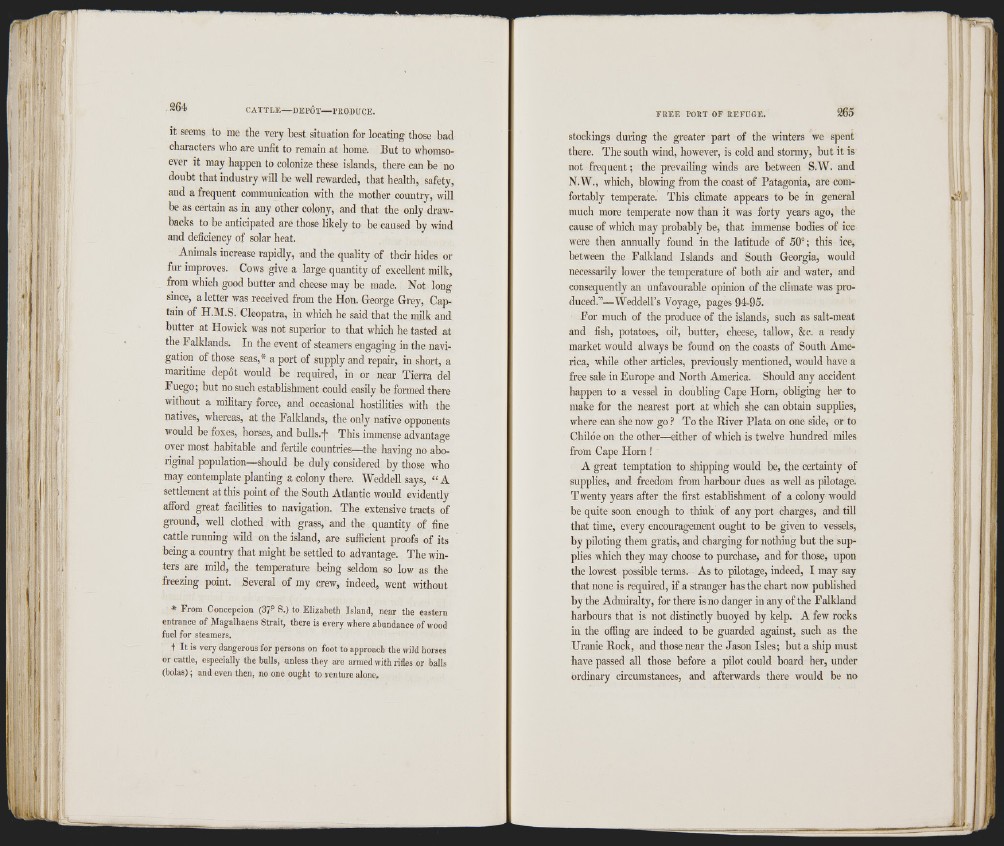
Í.Jfl 7;
I’!' ' t í ' '
if ' 1*'
' ’Vi ' '
:■ 1
( .
i ' '‘í
264 CATTLE DEPOT PKODÜCE.
it seems to me the very best situation for locating those bad
characters who are unfit to remain at home. But to whomsoever
it may happen to colonize these islands, there can be no
doubt that industry will be well rewarded, that health, safety,
and a frequent communication with the mother country, will
be as certain as in any other colony, and that the only drawbacks
to be anticipated are those likely to be caused by wind
and deficiency of solar heat.
Animals increase rapidly, and the quality of their hides or
fur improves. Cows give a large quantity of excellent milk,
from which good butter and cheese may be made. Not long
since, a letter was received from the Hon. George Grey, Captain
of H.M.S. Cleopatra, in which he said that the milk and
butter at Howick was not superior to that which he tasted at
the Falklands. In the event of steamers engaging in the navigation
of those seas,* a port of supply and repair, in short, a
maritime depot would be required, in or near Tierra del
Fuego; but no such establishment could easily be formed there
without a military force, and occasional hostilities with the
natives, whereas, at the Falklands, the only native opponents
would be foxes, horses, and bulls.-)- This immense advantage
over most habitable and fertile countries—the having no aboriginal
population—should be duly considered by those who
may contemplate planting a colony there. Weddell says, “ A
settlement at this point of the South Atlantic would evidently
afford great facilities to navigation. The extensive tracts of
ground, well clothed with grass, and the quantity of fine
cattle running wild on the island, are sufficient proofs of its
being a country that might be settled to advantage. The winters
are mild, the temperature being seldom so low as the
freezing point. Several of my crew, indeed, went without
* From Concepcion (37° S.) to Elizabeth Island, near tlie eastern
entrance of Magalhaens Strait, there is every where abundance of wood
fuel for steamers.
t It is very dangerous for persons on foot to approach the wild horses
or cattle, especially the bulls, unless they are armed with rifles or balls
(bolas); and even then, no one ought to venture alone.
FREE FORT OF REFUGE. 265
stockings during the greater part of the winters we spent
there. The south wind, however, is cold and stormy, but it is
not frequent; the prevailing winds are between S.W. and
N.W., which, blowing from the coast of Patagonia, are comfortably
temperate. This climate appears to be in general
much more temperate now than it was forty years ago, the
cause of which may probably be, that húmense bodies of ice
were then annually found in the latitude of 50°; this ice,
between the Falkland Islands and South Georgia, would
necessarily lower the temperature of both air and water, and
consequently an unfavourable opinion of the climate was produced.”—
Weddell’s Voyage, pages 94-95.
For much of the produce of the islands, such as salt-meat
and fish, potatoes, oil, butter, cheese, tallow, &c. a ready
market would always be found on the coasts of South America,
while other articles, previously mentioned, would have a
free sale in Furope and North America. Should any accident
happen to a vessel in doubling Cape Horn, obliging her to
make for the nearest port at which she can obtain supplies,
where can she now go ? To the Iliver Plata on one side, or to
Chiloe on the other—either of which is twelve hundred miles
from Cape Horn !
A great temptation to shipping would be, the certainty of
supplies, and freedom from harbour dues as well as pilotage.
Twenty years after the first establishment of a colony would
be quite soon enough to think of any port charges, and till
that time, every encouragement ought to be given to vessels,
by piloting them gratis, and charging for nothing but the supplies
which they may choose to purchase, and for those, upon
the lowest possible terms. As to pilotage, indeed, I may say
that none is required, if a stranger has the chart now published
by the Admiralty, for there is no danger in any of the Falkland
harbours that is not distinctly buoyed by kelp. A few rocks
in the offing are indeed to be guarded against, such as the
Uranie Rock, and those near the Jason Isles; but a ship must
have passed all those before a pilot could board her, under
ordinary circumstances, and afterwards there would be no
J , ' I
I 'J
Í »
I* j
i l